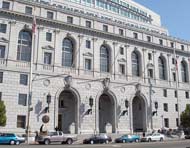9/26/2008
California Supreme Court to Review Red Light CamerasSupreme Court of California will hear a challenge to the legality of contingent fee contract arrangements for red light cameras.

The Supreme Court of California agreed to review a lower court decision that shielded the state's growing number of municipal red light camera programs from challenge. At issue is whether a local government can legally pay a monetary bonus to a private company for each conviction it generates with an automated enforcement program. In June, a three-judge panel of the Court of Appeals saw no problem with such arrangements (view decision). The Supreme Court's review will only examine part II of the decision in answer to the following question:
"Are contracts between local governments and a private, for-profit entity inherently void as against public policy, where the contracts require the private entity to be principally responsible for vital law enforcement-related tasks, including generating, processing and defending in court the sole evidence of an alleged violator's guilt, and the entity's compensation is based on the number of criminal convictions obtained?"
The appeals panel's June decision consolidated a number of red light camera cases so that the court could dismiss a number of challenges commonly brought against photo enforcement programs. The judges concluded that since the legislature has now explicitly banned contingent fee contracts, the contingent fee issue was moot. It went on to argue that, even if lawmakers had not acted, the appeals court would still have endorsed municipal efforts. The court dismissed evidence that Affiliated Computer Services (ACS) issued tickets to Los Angeles drivers who entered an intersection while the light was yellow, concluding that such instances offered no proof that the manipulation was intentional or induced by a per-ticket profit incentive.
The lawyers challenging the camera program found the panel's reasoning self-contradictory and wrong as a matter of law. Moreover, the lawyers asserted that bounty payments undermine the entire judicial system.
"Such contingency agreements are condemned, particularly in the criminal law context, because even if they never result in actual harm, by their very nature they tend to invite corruption, and thus undermine the public's faith in the fair and impartial administration of justice," the lawyers wrote in their petition to the supreme court. "The very feature of these programs that made them so attractive to municipalities -- the delegation of almost all the work to ACS -- poses significant questions as to whether they inherently threatened the integrity of the criminal justice system."
The lawyers proceeded to cite several examples of how vendors exercised complete control over the ticketing process, despite claims officials made regarding their "oversight" of the system. First, municipalities can take advantage of "bulk approval" of citations which happens when a police officer, with the press of one button, approves a stack of red light camera tickets without any individual review. Contracts require that cities "diligently prosecute" each ticket sent over by the private firm, creating pressure to generate convictions. The contractor also sets up a "Traffic Violations Bureau" to take calls from citizens who receive tickets with the sole purpose of assuring citizens that the devices are infallible. Finally, the contractors provide "expert testimony" in court cases regarding the infallibility of the cameras.
Despite the evidence, the petitioners in this case face an uphill battle. In 2005, the supreme court acted in a manner transparently designed to protect red light camera programs from a class action challenge. It upheld without comment a ruling that found the city of Costa Mesa had violated the law by issuing red light camera tickets at intersections where a required thirty-day warning was not given. However, to prevent the need to refund hundreds of thousands of tickets, the court deemed the decision "unpublished" so that it could not be cited as precedent in the sixty-six cities that admitted ignoring the warning period (more info). Any recipient of an illegal ticket outside of Costa Mesa would have to present the same argument from scratch each time to receive a refund.
Lawyers argue that the case is worth fighting because the implications of the appeals court decision could reach far beyond photo enforcement.
"Its published opinion sets a dangerous precedent that gives cash-strapped municipalities broad authority to retain private, for-profit entities to perform a wide array of law enforcement functions other than in the red light camera context, and to compensate them based solely on the number of convictions obtained -- so long as the municipalities retain some modicum of oversight and the 'final' decision-making authority," the challengers wrote. "Supreme Court review is warranted to correct this dangerous erosion of long-standing California precedent and preserve the public's confidence in the integrity of this state's administration of justice."


